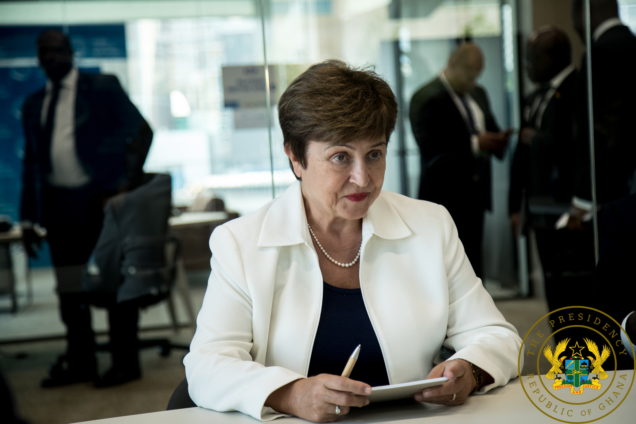International Monetary Fund (IMF) chief Kristalina Georgieva said she told China’s new top economic official, Li Qiang, they must accelerate work to reach debt restructuring agreements for countries like Zambia, Ghana and Ethiopia.
Georgieva, who met with Li and other top Chinese officials during a visit to China last month, said on Thursday she found Li very approachable and pragmatic.
She said he assured her that he wants China to play a constructive role in resolving debt relief cases.
“The truth is, and I was ... very straightforward on that, it takes far too long for that (debt) resolution,” she told an event hosted by Meridian House and Politico.
“Yes, China has multiple institutions that deal with that, that makes it complicated domestically, but they have to speed up their participation.”
The United States and other Western countries have faulted China for causing delays in setting up restructuring agreements for heavily indebted countries that have asked for help under the Common Framework set up by the Group of 20 major economies.
Georgieva noted China had been helpful in reaching a debt relief deal for Chad, and also Sri Lanka, a middle-income country that was not eligible for help under the G20 framework, and she encouraged China to show progress on other cases.
About 60% of low-income countries are already in or at risk of debt distress, and about 25% of emerging economies are at high risk and facing “default-like” borrowing spreads, Georgieva said.
Georgieva said that during her visit Chinese officials underscored their commitment to multilateralism, opening up China’s economy for more trade, and debt restructuring.
The IMF this week said rising geopolitical tensions and the resulting fragmentation of the global economy could increase financial stability risks, reducing cross-border investments, asset prices, payment systems and banks’ ability to lend.
The global lender has long warned of increased costs, economic friction and GDP output losses associated with the global economy’s fragmenting into geopolitical blocs, with U.S.-led democracies on one side and China and other autocratic states on another. Those concerns have been heightened since Russia’s invasion of Ukraine.
Georgieva said Chinese officials also worried about fragmentation, but their foremost concern was securing jobs at home, with a target of creating 12 million jobs this year.
Latest Stories
-
Herman Suede set to release ‘How Dare You’ on April 22
52 mins -
Heal KATH: Kuapa Kokoo, Association of Garages donate 120k to support project
1 hour -
KNUST signs MOU with Valco Trust Fund, Bekwai Municipal Hospital to build student hostel
1 hour -
The influence Ronaldo has on people, Cadman Yamoah will have same on the next generation – Coach Goodwin
2 hours -
Gender Advocate Emelia Naa Ayeley Aryee Wins prestigious Merck Foundation Awards
3 hours -
South Africa bursary scandal suspects granted bail
3 hours -
Ecobank successfully repays $500m Eurobond due April 18
3 hours -
Re: Doe Adjaho, Torgbui Samlafo IV, call for Unity among Paramountcies in Anlo
3 hours -
Extortion and kidnap – a deadly journey across Mexico into the US
3 hours -
Rihanna says fashion has helped her personal ‘rediscovery’ after having children
4 hours -
Development Bank Ghana targets GH¢1bn funding for commercial banks in 2024
4 hours -
Shatta Movement apologises to Ghana Society of the Physically Disabled after backlash
5 hours -
Sammy Gyamfi writes: Tema-Mpakadan Railway Project; A railway line to nowhere
5 hours -
Bright Simons: Is the World Bank saving or harming Ghana?
5 hours -
CAF Cup: RS Berkane banned from entering Algeria because of a map of Morocco with its Sahara
6 hours

